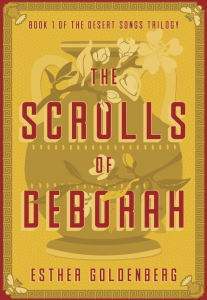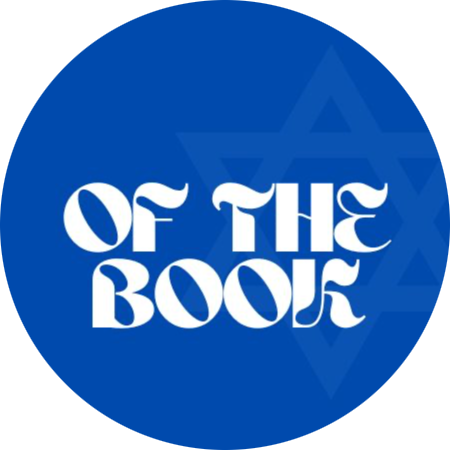(reviewed by Monette Moradi)

Esther Goldenberg, The Scrolls of Deborah: The Desert Songs Trilogy, Book 1, 100 Block by Row House Publishing, May 2024, 384 pgs.
There is a myriad of female role models in any of the Ten Sacred Texts of Judaism; however, their presence only reinforces the religious values expected of Jewish women via the male gaze primarily. In truth, their characterization is often lacking, mentioned as secondary to the holy texts in which they are written. At the same time, we are taught that every word mentioned has a purpose and is not wasted. This is the launching point for Esther Goldenberg in the first book of her Desert Songs Trilogy, entitled The Scrolls of Deborah. While taking the building blocks of known mythologies and providing a feminist perspective to a mythological tale is nothing new, this book offers a much-needed, firmly Jewish addition to the sub-genre of religious fiction.
The first challenge writers in this genre face is to justify their existence while still providing a well-written narrative. In this instance, it comes from Parashat Bereshit, perek 35, pasuk 8, which mentions that Deborah, Rifka’s nurse, died and was buried. From there, the initial creative liberties of the family tree are constructed around the title character. Once the story devolves to the “main plot” of Bereshit, with the story of the Patriarchs and Matriarchs intertwined until Deborah’s passing, the author’s skill becomes clear, imparting messages on the theme of spiritual connection and mental health self-care through religious devotion.
This is where Goldenberg sets herself apart from many writers in her field. She leads a conversation with her readers about the impact they already have within their marriage and home, using the characters of Deborah and the Matriarchs through a recurring moment of only showing the women engaged in meditative prayer to Hashem. More importantly, it is how the author stresses that it is the women who should play a part in educating their children on how to lead a life in service to the Almighty.
While the deviations from the typical understanding of “plotlines” and “characters” are a frankness to which the reader must acclimate, The Scrolls of Deborah would make the ideal pick for Jewish women’s book clubs. This is aided by the book’s structure using scrolls as the main chapters and parchments to denote the subsections. This way, potential book club leaders can organize their meetings at a reading pace appropriate to the needs of their members. Perhaps not coincidentally, there is a parallel to the scenes of women praying that are in the book itself.
